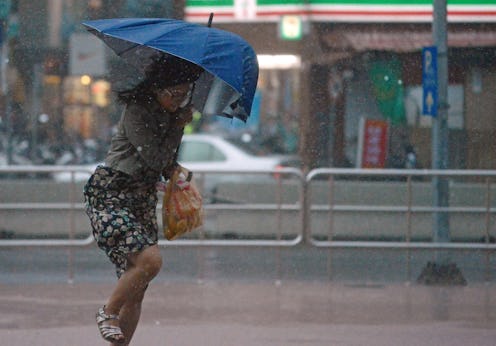News
How To Prepare For Hurricane Joaquin
As Hurricane Joaquin passed through the Bahamas on Thursday, the East Coast braces for heavy rain and the possibility of the storm reaching the U.S. over the weekend. Even if the Category 4 storm doesn't make it all the way to the U.S., states from North Carolina to Massachusetts could experience destructive flooding and heavy winds, and officials in New Jersey, Virginia, and North Carolina have already declared a state of emergency. Since the exact trajectory of the storm is still unclear, it's important to prepare for Hurricane Joaquin if you're on the East Coast this weekend.
On Thursday, the eye of the storm passed over Samana Cays in the Bahamas, with sustained winds up to 125 miles per hour. North Carolina Gov. Pat McCrory said in a statement: "The combination of wind gusts from various weather systems and any additional rain from Joaquin could lead to downed trees and power outages in many areas, not just the coast." President Obama has been briefed on the hurricane, and White House spokesman Josh Earnest told USA Today: "Federal Emergency Management Agency offices stand ready to assist states and tribes as needed and as requested."
To keep yourself safe, there are some things you should do to prepare for Hurricane Joaquin if your state's in the storm's potential path.
The Basics
- Have a plan for where to go if you have to evacuate the area, checking your local evacuation routes.
- Assemble a supply kit with necessities like a flashlight, batteries, cash, first aid supplies, and copies of your important documents (i.e. birth certificate, insurance information, and passport).
- Buy nonperishable food and bottled water — FEMA recommends having one gallon of water per person for at least three days.
- Keep your phone and laptop charged.
- Plan how to communicate with your family if your phone dies and/or you lose power.
For Your House
If the possibility of Hurricane Joaquin reaching the U.S. increases in the next few days, there are few precautions you should take to protect your home as well, according to FEMA.
- Bring small, loose items that could be swept away in high winds inside.
- Trim any trees that are close to your house to prevent branches from breaking and damaging your home.
- Board up windows if you don't have storm shutters.
- Turn your refrigerator and freezer to the coldest settings and open sparingly so food will last longer if the power goes out.
Continue to check storm updates and emergency instructions in your area until the storm has passed, and stay safe.
